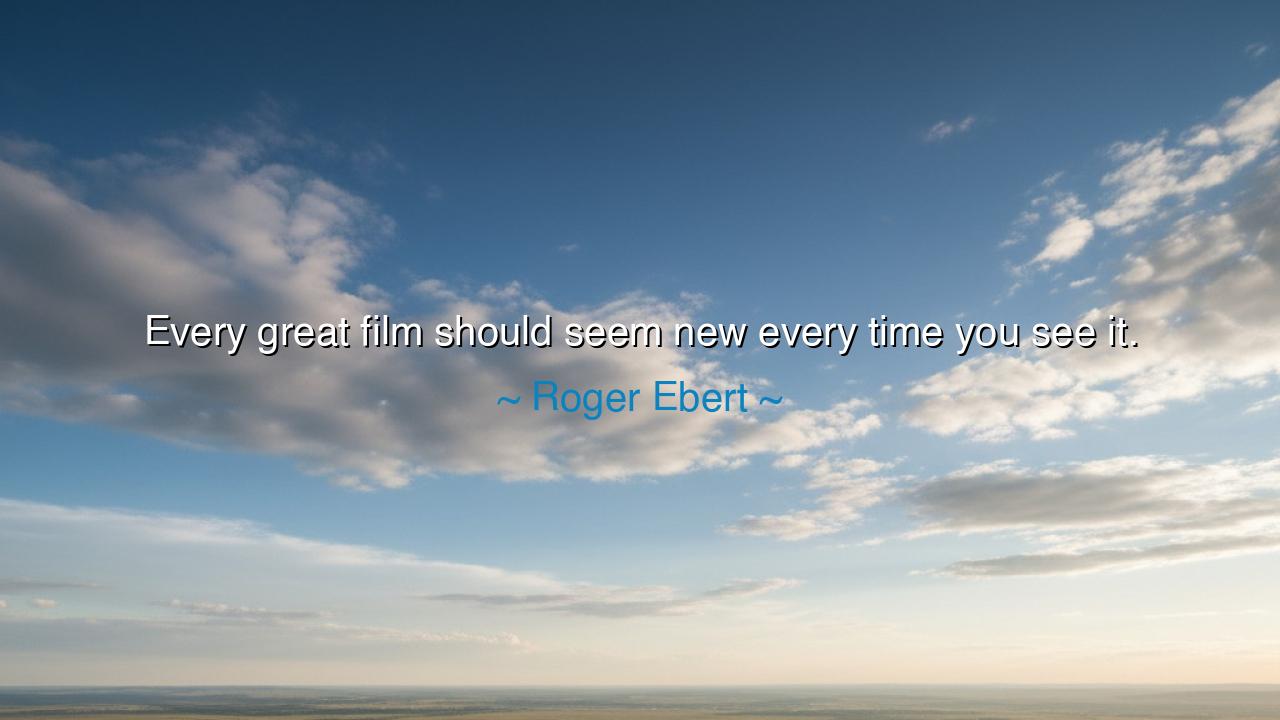
Every great film should seem new every time you see it.






Hear the luminous words of Roger Ebert, sage of cinema and interpreter of stories, who declared: “Every great film should seem new every time you see it.” Though short, this phrase is filled with great depth, for it touches the eternal nature of true art. A shallow work offers all it has in a single glance; once seen, it is exhausted, its secrets spent. But a great film, like a great poem or painting, carries inexhaustible riches. Each return to it reveals fresh detail, new meaning, or forgotten beauty. It is a river one may step into again and again, yet it is never the same river.
The meaning of this saying lies in the mystery of layers. A great film does not simply tell a story; it weaves together sight, sound, dialogue, symbol, and emotion. To watch once is to glimpse only the surface. But as time passes, and the viewer returns with new experiences, the film reveals what was hidden before. Thus, the same story can feel new, because the one who beholds it is no longer the same person they were. Ebert, with the wisdom of a critic who had lived a life among films, knew that this capacity for renewal is the true test of greatness.
Consider the example of Citizen Kane, a film often named the greatest of its kind. To a first-time viewer, it is the tale of a powerful man’s rise and fall. Yet upon returning, one notices the shifting perspectives, the play of light and shadow, the symbols of loneliness within Kane’s opulence. To watch it in youth is to see ambition; to watch it in age is to see loss. It is not that the film has changed, but that life itself has taught the viewer new eyes. This is what Ebert meant: the truly great film lives with you, growing as you grow.
History echoes this principle beyond cinema. When the Greeks recited the Iliad, generations of listeners never tired of hearing it. Each time, they discovered a new facet of Achilles’ wrath, Hector’s courage, or the sorrow of Priam. The tale remained the same, yet to each soul in each season of life, it seemed fresh. This is the eternal quality of great art—it transcends the moment of its making and becomes a mirror of every age, every heart.
The emotional force of Ebert’s quote also reminds us that a film’s greatness lies not in spectacle alone, but in its truth. The explosions, the costumes, the laughter may fade, but truth—about love, about power, about loss, about joy—remains. And truth is never exhausted, for it is infinite. Each time we approach it, we are struck anew. Thus, the film becomes a companion, a teacher, and sometimes even a spiritual guide, always waiting to give us what we are ready to see.
The lesson here is clear: return often to the works that move you, whether they be films, books, or songs. Do not say, “I have seen it once, and that is enough,” for if it is truly great, you have not yet seen all it has to offer. Let your life’s changes—your struggles, your triumphs, your sorrows—shape the way you receive the work anew. Great art is not a single gift; it is a fountain, flowing without end.
So, children of tomorrow, carry this wisdom as you walk through life: seek the films, the stories, the creations that seem new each time. Let them grow with you, let them challenge you, let them reveal to you truths that are endless. For as Roger Ebert proclaimed, “Every great film should seem new every time you see it.” And in that renewal lies the proof that art, like life itself, is infinite in its mystery, eternal in its beauty, and forever capable of awakening wonder in the human soul.






AAdministratorAdministrator
Welcome, honored guests. Please leave a comment, we will respond soon